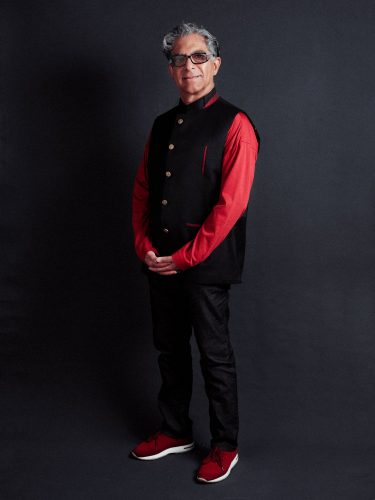Did you join Family Weekend for the special virtual evening with Dr. Deepak Chopra, moderated by Mike Tirico ’88?
 Dr. Chopra was interviewed about mindfulness, meditation and self-care practices in order to help cope with these uncertain times. Dr. Chopra is a pioneer in integrative medicine and personal transformation. He’s been involved in health and wellness for more than two decades and has been a leading force in how to handle mental setbacks. He is the founder of Chopra Global, a leading whole health company as well as the Chopra Foundation which is a non-profit entity for research on well-being and humanitarianism. In addition to this, he is a professor of family medicine and public health at the University of California, San Diego. He is also the author of “Total Meditation,” which helps achieve new dimensions of stress free and joyful living.
Dr. Chopra was interviewed about mindfulness, meditation and self-care practices in order to help cope with these uncertain times. Dr. Chopra is a pioneer in integrative medicine and personal transformation. He’s been involved in health and wellness for more than two decades and has been a leading force in how to handle mental setbacks. He is the founder of Chopra Global, a leading whole health company as well as the Chopra Foundation which is a non-profit entity for research on well-being and humanitarianism. In addition to this, he is a professor of family medicine and public health at the University of California, San Diego. He is also the author of “Total Meditation,” which helps achieve new dimensions of stress free and joyful living.
Here are 8 things I learned from An Evening with Dr. Deepak Chopra!
- It is important to accept what is going on in the world at the moment. The world is very uncertain right now, and all we can do is accept it and try to focus on ourselves and how we are going to be healthy and happy.
- Focus on what you are grateful for. This is a great habit to have in your life and it promotes a healthy and stress free mindset. Take the time out of your day every morning to write down what you are grateful for. For instance, your friends, family, health or the house or apartment you live in.
- When you are feeling anxious, ask yourself what you are feeling anxious about. Ask yourself questions about what is triggering the anxiety, whether or not it involves you or someone else.
- The simple things matter in life. Exercise, good diet, getting 8 hours of sleep, all make a dramatic difference in how we feel.
- There are more ways than just meditation to cope with stress. For example, listening to music, dancing, exercise, writing and laughing are all different ways to cope with stress without meditating.
- In order for our body to be in its ‘natural’ state we must follow these pillars: sleep, emotional resilience, emotional intelligence, stress management, exercise, deep breathing, balanced nutrition, healthy relationships and getting outside with nature.
- Be there for others especially during a tough time. You can do this by listening, acknowledging that you are there for them, appreciating that they are in your life and accepting who they are. In other words, not trying to change people.
- There are many ways to stay connected to your peers during a pandemic. For instance, take advantage of social media and technology that is available. We are so lucky that we can pick up our cell phones and text, FaceTime and call our friends and family members.
Dr. Chopra ended his discussion with a very inspirational and empowering message, “Be the change you want to see in the world.” I hope you found these 8 things helpful and will incorporate them into your everyday life here on our Syracuse Community and around the world!
Written by Haley Mykytka ’22, College of Visual and Performing Arts
